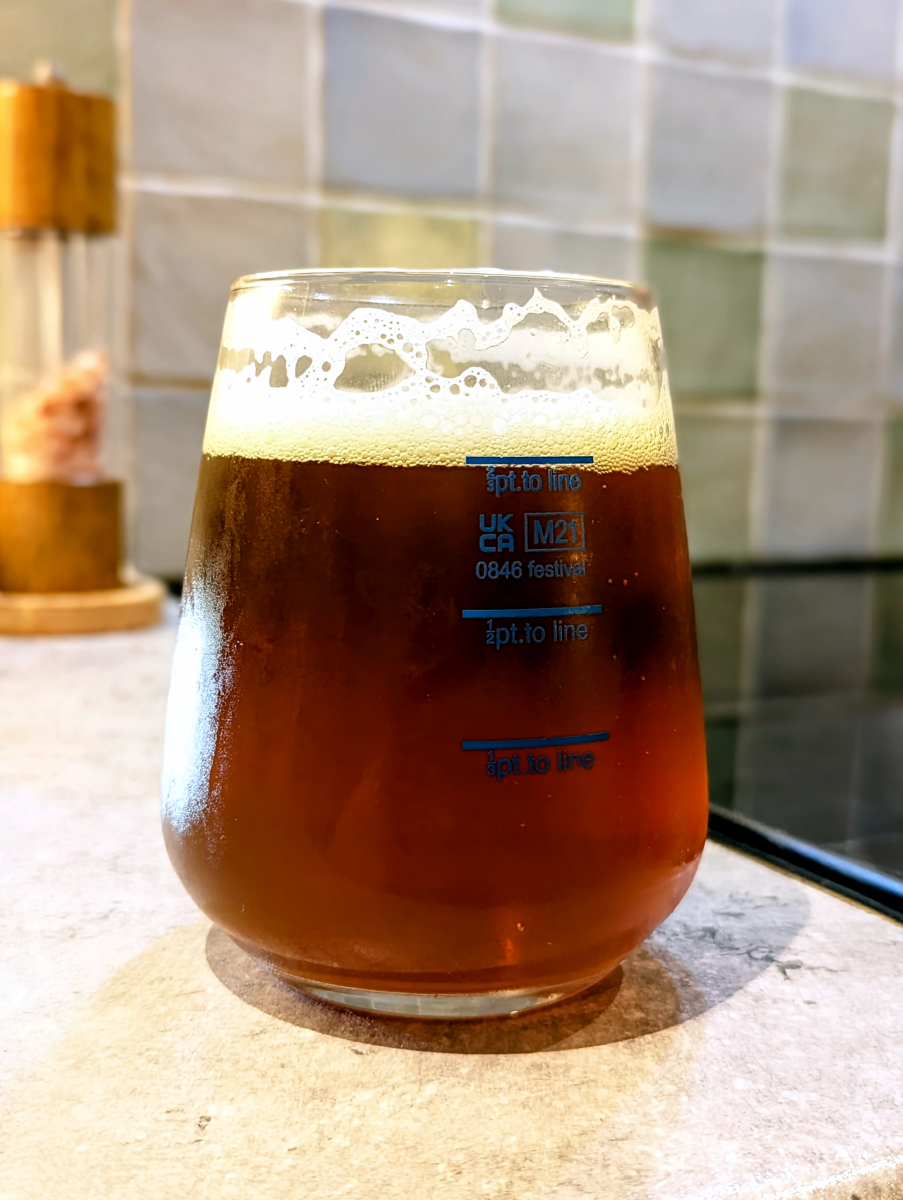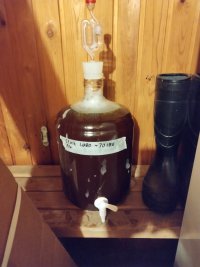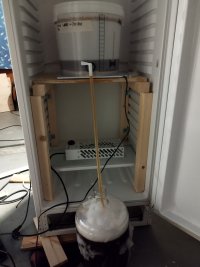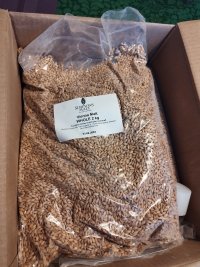I think I might even have this book...My source is Porter! By Ron. He has a chapter in it regarding oak flavour and lining of barrels.
You are using an out of date browser. It may not display this or other websites correctly.
You should upgrade or use an alternative browser.
You should upgrade or use an alternative browser.
English Ales - What's your favorite recipe?
- Thread starter Puddlethumper
- Start date
-
- Tags
- recipe

Help Support Homebrew Talk:
This site may earn a commission from merchant affiliate
links, including eBay, Amazon, and others.
Colindo
Well-Known Member
They used a special oak from North-Eastern Prussia called Memel oak that was said to give virtually no flavour Oak and WW II
Not to think everyone's following my question about the earthy / rye flavor, but I think I stumbled across something that helps figure it out. And I mention it as an idea others might try if they are curious about what creates the various tastes?
I took a gravity sample, meaning I squirted some beer into the tall tube to prep for the hydrometer. I then covered it in plastic wrap and a tight rubber band and came back to it like 2 days later. That flavor was totally gone.
I am thinking... that means it was somewhat volatile, and likely yeast or hops, probably the latter. Because, if it was the malt, it should still be there? Is that a tricky way to remove hop (and / or yeast) smells and flavors to allow a person to focus on the malt contribution?
It's more "beer theory" I guess but of course pertains to an earlier question here about my ESB-like recipe.
I took a gravity sample, meaning I squirted some beer into the tall tube to prep for the hydrometer. I then covered it in plastic wrap and a tight rubber band and came back to it like 2 days later. That flavor was totally gone.
I am thinking... that means it was somewhat volatile, and likely yeast or hops, probably the latter. Because, if it was the malt, it should still be there? Is that a tricky way to remove hop (and / or yeast) smells and flavors to allow a person to focus on the malt contribution?
It's more "beer theory" I guess but of course pertains to an earlier question here about my ESB-like recipe.
Northern_Brewer
British - apparently some US company stole my name
Gary Gillman (beeretseq) is the man to give you (more information that you could possibly want on) wood, eg :
https://www.beeretseq.com/from-baltic-wood-to-bourbon-wood-british-beer-evolves/
https://www.beeretseq.com/from-baltic-wood-to-bourbon-wood-british-beer-evolves/
Interresting read.
I boiled the oak cubes to draw out any tannins before use, as I already knew brewers back then steamed and in other ways treated their casks to reduce flavour impact.
But I still find it hard to believe that beer aged for 6months+ in oak casks, even ones made from Memel oak, would not pick up any flavour at all from the wood, however subtle.
I boiled the oak cubes to draw out any tannins before use, as I already knew brewers back then steamed and in other ways treated their casks to reduce flavour impact.
But I still find it hard to believe that beer aged for 6months+ in oak casks, even ones made from Memel oak, would not pick up any flavour at all from the wood, however subtle.

$172.35
2 Inch Tri Clamp Keg Manifold With Ball Lock Posts, Pressure Gauge, PRV (0-30 PSI) – Homebrew, Fermentation, Kegging System
wuhanshijiayangzhiyimaoyiyouxiangongsi

$22.00 ($623.23 / Ounce)
AMZLMPKNTW Ball Lock Sample Faucet 30cm Reinforced Silicone Hose Secondary Fermentation Homebrew Kegging joyful
无为中南商贸有限公司

$58.16
HUIZHUGS Brewing Equipment Keg Ball Lock Faucet 30cm Reinforced Silicone Hose Secondary Fermentation Homebrew Kegging Brewing Equipment
xiangshuizhenzhanglingfengshop

$53.24
1pc Hose Barb/MFL 1.5" Tri Clamp to Ball Lock Post Liquid Gas Homebrew Kegging Fermentation Parts Brewer Hardware SUS304(Gas MFL)
Guangshui Weilu You Trading Co., Ltd
![Craft A Brew - Safale S-04 Dry Yeast - Fermentis - English Ale Dry Yeast - For English and American Ales and Hard Apple Ciders - Ingredients for Home Brewing - Beer Making Supplies - [1 Pack]](https://m.media-amazon.com/images/I/41fVGNh6JfL._SL500_.jpg)
$6.95 ($17.38 / Ounce)
$7.47 ($18.68 / Ounce)
Craft A Brew - Safale S-04 Dry Yeast - Fermentis - English Ale Dry Yeast - For English and American Ales and Hard Apple Ciders - Ingredients for Home Brewing - Beer Making Supplies - [1 Pack]
Hobby Homebrew

$28.98
Five Star - 6022b_ - Star San - 32 Ounce - High Foaming Sanitizer
Great Fermentations of Indiana

$10.99 ($31.16 / Ounce)
Hornindal Kveik Yeast for Homebrewing - Mead, Cider, Wine, Beer - 10g Packet - Saccharomyces Cerevisiae - Sold by Shadowhive.com
Shadowhive

$53.24
1pc Hose Barb/MFL 1.5" Tri Clamp to Ball Lock Post Liquid Gas Homebrew Kegging Fermentation Parts Brewer Hardware SUS304(Gas MFL)
yunchengshiyanhuqucuichendianzishangwuyouxiangongsi

$7.79 ($7.79 / Count)
Craft A Brew - LalBrew Voss™ - Kveik Ale Yeast - For Craft Lagers - Ingredients for Home Brewing - Beer Making Supplies - (1 Pack)
Craft a Brew

$176.97
1pc Commercial Keg Manifold 2" Tri Clamp,Ball Lock Tapping Head,Pressure Gauge/Adjustable PRV for Kegging,Fermentation Control
hanhanbaihuoxiaoshoudian

$479.00
$559.00
EdgeStar KC1000SS Craft Brew Kegerator for 1/6 Barrel and Cornelius Kegs
Amazon.com

$20.94
$29.99
The Brew Your Own Big Book of Clone Recipes: Featuring 300 Homebrew Recipes from Your Favorite Breweries
Amazon.com

$39.22 ($39.22 / Count)
Brewer's Best Home Brew Beer Ingredient Kit - 5 Gallon (Mexican Cerveza)
Amazon.com

$33.99 ($17.00 / Count)
$41.99 ($21.00 / Count)
2 Pack 1 Gallon Large Fermentation Jars with 3 Airlocks and 2 SCREW Lids(100% Airtight Heavy Duty Lid w Silicone) - Wide Mouth Glass Jars w Scale Mark - Pickle Jars for Sauerkraut, Sourdough Starter
Qianfenie Direct
My London 18th century inspried Porter finished with a fg of 1.035, down from 1.077. That is an attenuation of whooping 54%. The majority gets secondaried with two types of brett so the bretts surely are going to have some fun in there. The 12 0.33 bottles I managed to bottle will be closely monitored regarding overcarbonation.
I brewed this beer during the Christmas days so it had plenty of time to finish, Maybe the yeast (wlp whitbread) flocculated too hard? Maybe the big dose of Chevallier with it's high protein content drove the fg higher (that was my experience with previous Chevallier beers)? Maybe the other half of the grist, crisp imperial diastatic brown malt is finishing higher? Maybe my mash was too high and too thick for such a beer? Probably a combination of all of this?
Who knows.....
But what I know is that it does not taste sweet at all, it tastes perfectly balanced tbh. All the flavours are there, I am really looking forward to seeing how this one improves with age.
I brewed this beer during the Christmas days so it had plenty of time to finish, Maybe the yeast (wlp whitbread) flocculated too hard? Maybe the big dose of Chevallier with it's high protein content drove the fg higher (that was my experience with previous Chevallier beers)? Maybe the other half of the grist, crisp imperial diastatic brown malt is finishing higher? Maybe my mash was too high and too thick for such a beer? Probably a combination of all of this?
Who knows.....
But what I know is that it does not taste sweet at all, it tastes perfectly balanced tbh. All the flavours are there, I am really looking forward to seeing how this one improves with age.
My experience with the 2 late 1800's inspired stouts/porters I have brewed so far has been that the high proportion of brown, possibly amber and a good dose of black malt, maybe around half the base as mild malt and a dash of crystal certainly don't aid attenuation...
The second one maturing in bottles finished at ~72% AA which is probably around where these beers finished in this era, considering the fact they usually racked with a few more points to go.
Finishing low-ish is imo beneficial to these beers, to balance the hefty roast, my ~68% AA old timey porter whose keg I just started from don't taste sweet to me, but rather full and roasty, the roast prob would be overpowering if it was as dry as a modern porter.
The second one maturing in bottles finished at ~72% AA which is probably around where these beers finished in this era, considering the fact they usually racked with a few more points to go.
Finishing low-ish is imo beneficial to these beers, to balance the hefty roast, my ~68% AA old timey porter whose keg I just started from don't taste sweet to me, but rather full and roasty, the roast prob would be overpowering if it was as dry as a modern porter.
I think so too. The grist was simple, 50/50 Chevallier/Crisp Imperial, so it has a lower attenuating base malt AND 50% brown malt. I added a bit of Carafa 2 Spezial for colour. 54% is LOW, even for back in the day standards, but as long as it tastes good, all good to me! I think we should also keep in mind that beer was food back in the days and any carbs that were still in the liquid were probably just extra nutrition.My experience with the 2 late 1800's inspired stouts/porters I have brewed so far has been that the high proportion of brown, possibly amber and a good dose of black malt, maybe around half the base as mild malt and a dash of crystal certainly don't aid attenuation...
The second one maturing in bottles finished at ~72% AA which is probably around where these beers finished in this era, considering the fact they usually racked with a few more points to go.
Finishing low-ish is imo beneficial to these beers, to balance the hefty roast, my ~68% AA old timey porter whose keg I just started from don't taste sweet to me, but rather full and roasty, the roast prob would be overpowering if it was as dry as a modern porter.
The result of this example tastes really balanced. There is actually not that much roast present, it certainly is not astringent or acrid or anything like that. I think the crisp Imperial is a really good malt, I will probably use that one in all of my future brews that require a brown malt. It is not as intense as a normal brown malt, but in a good way. So probably 10% "normal" brown malt would translate to somehting around 20-25% imperial malt.
How warm did you mash the Chev? My 90% Chev IPA was mashed at 65°C and I had similar attenuation to what I'd expect with MO.My London 18th century inspried Porter finished with a fg of 1.035, down from 1.077. That is an attenuation of whooping 54%. The majority gets secondaried with two types of brett so the bretts surely are going to have some fun in there. The 12 0.33 bottles I managed to bottle will be closely monitored regarding overcarbonation.
I brewed this beer during the Christmas days so it had plenty of time to finish, Maybe the yeast (wlp whitbread) flocculated too hard? Maybe the big dose of Chevallier with it's high protein content drove the fg higher (that was my experience with previous Chevallier beers)? Maybe the other half of the grist, crisp imperial diastatic brown malt is finishing higher? Maybe my mash was too high and too thick for such a beer? Probably a combination of all of this?
Who knows.....
But what I know is that it does not taste sweet at all, it tastes perfectly balanced tbh. All the flavours are there, I am really looking forward to seeing how this one improves with age.
Most my historical replications are from the time around the late 1800's - turn of the century, and to my understanding the brown malt used then was not all that different to the ~130-200 ebc stuff you can buy today.
I do not think so. The back in the days brown malt was diastatic and it was PROBABLY not evenly roasted. So kind of a mix of every degree of malt roast that we can think of from black malt to slightly toasted pale malt.Most my historical replications are from the time around the late 1800's - turn of the century, and to my understanding the brown malt used then was not all that different to the ~130-200 ebc stuff you can buy today.
If I remeber correctly it started at about 68 C and then dropped during a prolonged 2h mash. Had to go somewhere in between... but it was planned like that.How warm did you mash the Chev? My 90% Chev IPA was mashed at 65°C and I had similar attenuation to what I'd expect with MO.
I think you are thinking even further back, by the time I reference the drum roaster was standard and brown malt was no longer diastatic.
Oh Sorry, yes, I am referring to earlier times then.I think you are thinking even further back, by the time I reference the drum roaster was standard and brown malt was no longer diastatic.
You can see a rather stark decline in amounts of brown malt used by the 1880's somewhere, where they introduced the drum roaster and moved away from straw roasted brown malt due to the fire hazards associated with it.
That's interesting. Well, as long as you know what you got there... I'd buy myself some mild malt if I'm going to be a mildGot some malt today, they call it Vienna but looking at the color and the fact it is produced from English barley, I am fairly certain it actually IS mild malt.
But I guess Vienna is easier to sell on todays market.
I think only Fawcett and Muntons still market mild malt, both unavailable here.That's interesting. Well, as long as you know what you got there... I'd buy myself some mild malt if I'm going to be a mild
I don't remember exactly where, but I saw something about many UK maltsters rebranding their mild malt as Vienna a few years back, hence my relative certainty that this is, in fact, actually mild malt.
And if not Vienna and mild are fairly similair types, especially if made from UK barley.
An Ankoù
Well-Known Member
I'm sure you're right. I've got two sacks of "Vienna": one from Germany (Bestmalz) which I use for lagers and Vienna Red, and the other from Crisp's made from English Spring barley, which I use for my mild. I think they're malted and roasted pretty much identically, but the barley is different.Got some malt today, they call it Vienna but looking at the color and the fact it is produced from English barley, I am fairly certain it actually IS mild malt.
But I guess Vienna is easier to sell on todays market.
In fact if you follow the link and scroll down to the "recipes using this malt" section.....
https://crispmalt.com/malts/vienna-malt/
Colindo
Well-Known Member
@Miraculix I think I read somewhere that Chevallier leaves more protein in the beer. Certainly my improperly malted German one leaves tons of it. If that is part of the FG of your beer, then Brett will also not touch it.
@Erik the Anglophile The last batch of diastatic Brown Malt was sold in the 1950s
@Erik the Anglophile The last batch of diastatic Brown Malt was sold in the 1950s
I just saw an airlock bubble when I was down in the basement, no pellicle or anything yet but some activity is starting to work up in there.
And a question about bottling after it has been in secondary.
@DBhomebrew you have bottled a bretted Old Ale after lenghty secondary, it will be nearly completely flat right?
Should I just use the Beersmith priming calculator, set the temp to max(30c) and set the desired carbing vol to something like 2.5 and hope it lands me at 1.8-2 vols somewhere?
And the Brett still in the beer should be enough to eat up the sugar added with no need to add extra right? Brett seems like a rather hardy bugger.
@DBhomebrew you have bottled a bretted Old Ale after lenghty secondary, it will be nearly completely flat right?
Should I just use the Beersmith priming calculator, set the temp to max(30c) and set the desired carbing vol to something like 2.5 and hope it lands me at 1.8-2 vols somewhere?
And the Brett still in the beer should be enough to eat up the sugar added with no need to add extra right? Brett seems like a rather hardy bugger.
I followed standard operating procedures, nothing special. Targeted 2.0 as usual. No extra yeast.
You have to remember you're on a different timeline then you're used to. Bottling 9 months into a sacc-only beer, the yeast have been dormant for 8.5 months. With the brett, bottling at 9 months the brett's barely hitting its first REM cycle.
Looking at activity in the first couple days? Settle down, my friend. If sacc's timescale is human, brett's is tectonic.
ETA: I just took a look at my Old Ale Blends thread from last year. Posts in late June (1.014) and mid August (1.012) mention visible effervescence. Finished and bottled at 1.012 early September.
You have to remember you're on a different timeline then you're used to. Bottling 9 months into a sacc-only beer, the yeast have been dormant for 8.5 months. With the brett, bottling at 9 months the brett's barely hitting its first REM cycle.
Looking at activity in the first couple days? Settle down, my friend. If sacc's timescale is human, brett's is tectonic.
ETA: I just took a look at my Old Ale Blends thread from last year. Posts in late June (1.014) and mid August (1.012) mention visible effervescence. Finished and bottled at 1.012 early September.
Last edited:
Had a small sample of the winter ale I hooked up a few days ago, needs a few more days in the kegerator to come together but already very tasty. Sat in the cellar for about 4months before serving.
6.6% and best described as a hypothetical bastard child of a souped up Black Sheep Riggwelter and Shepherd's 1698.
A little liqourice, light roast and dark fruit.
6.6% and best described as a hypothetical bastard child of a souped up Black Sheep Riggwelter and Shepherd's 1698.
A little liqourice, light roast and dark fruit.
Attachments
Kegged my old ale today. Sulphur had completely dissipated. Sample I took from the fermenter after transfer was great. Done a few British strongs and similar in the last year and this is definitely shaping up to have the best balance.
It's really orange marmalade forward which is exactly what I wanted. Tastes fairly similar to the 2022 Fuller's Vintage Ale but needs a few weeks more conditioning for the edges to smooth a bit further. Finished pretty dry for the style which aids the somewhat dangerous level of drinkability.
It's really orange marmalade forward which is exactly what I wanted. Tastes fairly similar to the 2022 Fuller's Vintage Ale but needs a few weeks more conditioning for the edges to smooth a bit further. Finished pretty dry for the style which aids the somewhat dangerous level of drinkability.
Racked my co-pitched brett'd stock ale to secondary. Two weeks since brewday. 1.095 down to 1.023, same racking gravity as last year's. That one smelled like Belgian spice, this one like Belgian bubblegum. Likely brett c vs brett b.
Same oak level as Erik, 1g/L. Half of last year's dose. Hungarian medium. @Miraculix, my opinion of oak is that it should be a mouthfeel adjustment. If it comes through as flavor, it's too much. I find it helps bridge the gap between malt sweetness and hop/roast bitterness.
EKG in there too.


Same oak level as Erik, 1g/L. Half of last year's dose. Hungarian medium. @Miraculix, my opinion of oak is that it should be a mouthfeel adjustment. If it comes through as flavor, it's too much. I find it helps bridge the gap between malt sweetness and hop/roast bitterness.
EKG in there too.


Seems similar in color to mine, I think mine attenuated a bit too much in primary, 1.080-1.016.
So next year it will be a few percent less sugar and a 68c/60 min mash instead of 67/75 to leave some more sugar for the brett to work on, most likely the same primary yeast mix.
Mine was EKG/Fuggle, 1g/L each at 20min and Styrian Bobek ~1g/L in the secondary.
During the weekend after january turns to february I will brew my late 1800's inspired Imperial Stout
1.100 target OG, 90 IBU, 75% efficiency
GP/Mild malt 50/50 as base
12% Crisp Brown malt
8% each Simpson Black and Amber
5% t50 crystal (130ebc)
12% invert 3
Late hops and dry hops in secondary similair to the old ale, will be secondaried on oak and brett from a shot glass or two of old ale.
So next year it will be a few percent less sugar and a 68c/60 min mash instead of 67/75 to leave some more sugar for the brett to work on, most likely the same primary yeast mix.
Mine was EKG/Fuggle, 1g/L each at 20min and Styrian Bobek ~1g/L in the secondary.
During the weekend after january turns to february I will brew my late 1800's inspired Imperial Stout
1.100 target OG, 90 IBU, 75% efficiency
GP/Mild malt 50/50 as base
12% Crisp Brown malt
8% each Simpson Black and Amber
5% t50 crystal (130ebc)
12% invert 3
Late hops and dry hops in secondary similair to the old ale, will be secondaried on oak and brett from a shot glass or two of old ale.
Still been very much enjoying my English IPA.


Looks nice, I suppose it's a more modern day Brit IPA?
Similar threads
- Replies
- 7
- Views
- 2K
- Replies
- 18
- Views
- 2K
- Replies
- 27
- Views
- 5K

















































